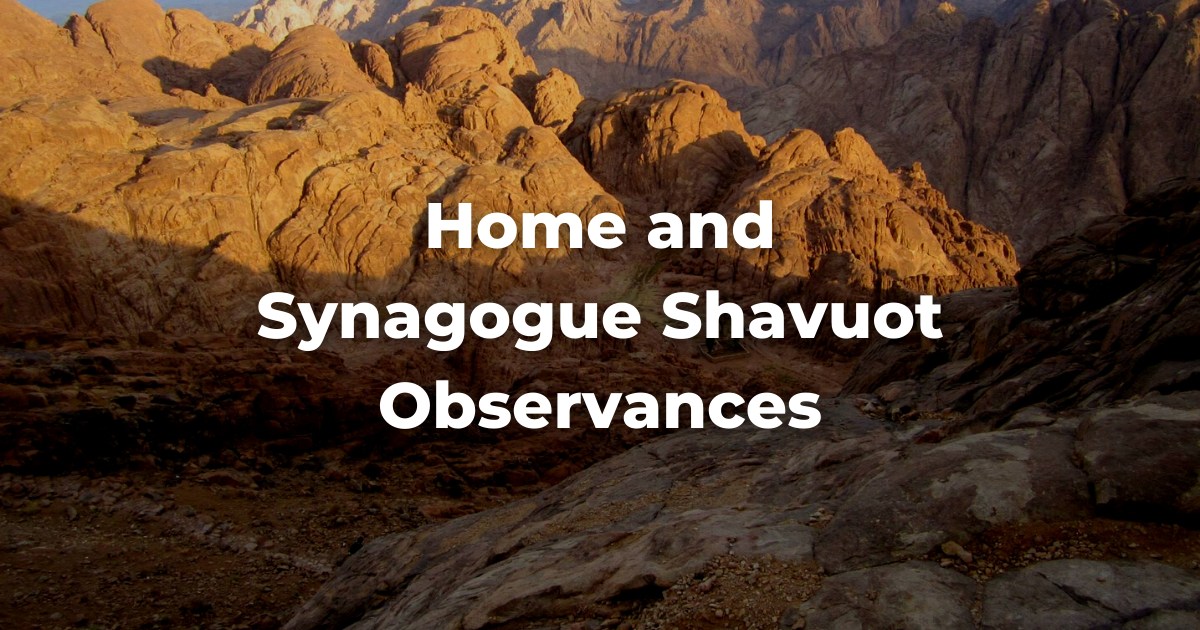Candle Lighting on Shavuot
The standard laws that relate to rest on the festivals apply to both days of Shavuot. No later than eighteen minutes before sundown on the eve of Shavuot, candles are lit.
Two blessings are recited: the standard blessing over festival candles:
בָּרוּךְ אַתָּה ה׳ אֱלֹהֵֽינוּ מֶֽלֶךְ הָעוֹלָם אֲשֶׁר קִדְּשָֽׁנוּ בְּמִצְוֹתָיו וְצִוָּֽנוּ לְהַדְלִיק נֵר שֶׁל יוֹם טוֹב:
Barukh attah adonai, eloheinu, melekh ha-olam, asher kidd’shanu b’mitzvotav v’tzivvanu l’hadlik neir shel yom tov.
Praised are You, Adonai, our God, Sovereign of the universe, who, sanctifying us with divine commandments, has commanded us to kindle the festival lamp.
and the She-heheyyanu (also written Shehechianu):
בָּרוּךְ אַתָּה ה׳ אֱלֹהֵינוּ מֶלֶךְ הָעוֹלָם שֶׁהֶחֱיָנוּ וְקִיְּמָנוּ וְהִגִּיעָנוּ לַזְמַן הַזֶּה:
Barukh attah adonai, eloheinu, melekh ha-olam, she-heheyyanu, vekiyamanu, vehigiyanu lezman hazeh.
Praised are You, Adonai, our God, Sovereign of the universe, who has given us life, sustained us, and brought us to this occasion.
On Shabbat, the first blessing ends:
בָּרוּךְ אַתָּה ה׳ אֱלֹהֵֽינוּ מֶֽלֶךְ הָעוֹלָם אֲשֶׁר קִדְּשָֽׁנוּ בְּמִצְוֹתָיו וְצִוָּֽנוּ לְהַדְלִיק נֵר שֶׁל שַׁבָּת וְשֶׁל יוֹם טוֹב:
Barukh attah adonai, eloheinu, melekh ha-olam, asher kidd’shanu b’mitzvotav v’tzivvanu l’hadlik neir shel shabbat v’shel yom tov
Praised are You, Adonai, our God, Sovereign of the universe, who, sanctifying us with divine commandments, has commanded us to kindle the Sabbath and festival lamp.
On the second night of Shavuot (or the first night if it follows Shabbat), the kindling of a flame would not be permitted, as the candles are not being lit prior to the holiday but on it.
But while fire cannot be kindled on the holiday it may be transferred, and so it has become customary to light a candle at the same time the candles are lit on the first night so that on the second night, or the first night that is immediately preceded by Shabbat, the candles can be lit merely by transferring a flame.
In addition, a special Yizkor candle is lit just prior to the formal holiday candles for the second day of Shavuot by those who will be reciting the Yizkor Service the following day. There is no blessing recited on the kindling of this candle, although many prayerbooks include appropriate devotional material to recite just before lighting the memorial candle.
Shavuot Services
There is a custom that services should not begin early on Shavuot as they may on the other holidays so as to make sure that the full sefirah counting-period is completed before the holiday begins.
On both days of the festival, Hallel is read and two scrolls of the TorahRefers to the first five books of the Hebrew Bible, the Tanakh, also called the Five Books of Moses, Pentateuch or the Hebrew equivalent, Humash. This is also called the Written Torah. The term may also refer to teachings that expound on Jewish tradition. Read more are removed from the Ark.
First Day of Shavuot
On the first day, we read from the first scroll the nineteenth and twentieth chapters of Exodus, which describe the giving of the Ten Commandments at Mount Sinai. It is customary for the congregation to stand while the Ten Commandments are read aloud, and to remain standing until the individual honored with that aliyah concludes the final blessing.
The maftir portion, Numbers 28:26–31, which describes the sacrificial requirements for Shavuot, is then read from the second scroll. The haftarah is Ezekiel 1:1–28, Ezekiel 3:12, which describes the prophet’s experience of God’s revelatory presence, a kind of personal version of the national revelation that took place at Sinai.
Second Day of Shavuot
On the second day, the reading from the first scroll is Deuteronomy 15:19–16:17, which describes the observance of the festivals in ancient times. On Shabbat, however, the reading begins at Deuteronomy 14:22 and the number of aliyot is increased to seven. The haftarah is taken from the second and third chapters of the Book of Habakkuk.
Akdamut and Megillat Ruth
A long, complex, and very beautiful hymn known as Akdamut is read in many synagogues as part of the Shavuot liturgy. It is customarily chanted before the Torah reading on the first day. It is also customary to read the Book of Ruth on the second day of Shavuot.
When it is read in synagogue, Ruth is generally read from a printed book, not from a scroll. Even in congregations in which Ruth is read from a scroll, however, there is neither an introductory nor a concluding blessing.
Why is Ruth associated with this holiday?
The simplest answer is merely that the Book of Ruth describes events that took place in the season of Shavuot. Another, more satisfying explanation is that Ruth herself is understood as a model of Jewish piety: just as she accepted Judaism wholeheartedly and refused to return to her parents’ home in Moab after the death of her husband, so did the Jewish people accept the revelation of God’s Torah at Sinai without hesitation or uncertainty.
Yizkor on Shavuot
The Yizkor Service, discussed in more detail above and elsewhere in this volume by Rabbi Carl Astor, is recited on the second day of Shavuot, just as on Yom Kippur, Shemini Atzeret, and the eighth day of Passover.
Click here to find Akdamut, Yizkor, and other Shavuot texts provided by the Rabbinical Assembly.
Tikkun Leil Shavuot
One of the most interesting (and unexpected) revivals of a custom long fallen into almost universal disuse has to do with the reintroduction of the Tikkun Leil Shavuot in recent years.
Originally a custom developed by medieval mystics, the Tikkun is an event during which people remain awake throughout the first night of Shavuot studying Torah and then recite the Morning Service at sunrise. What could be more appropriate than immersion in Torah study as part of one’s observance of the holiday which celebrates the receiving of the Torah?
Rabbi Isaac Klein relates an alternate explanation of staying awake all night: that this custom arose because the Israelites camped at Sinai were sleeping far too soundly and the thunder that accompanied the giving of the Torah was sent along to wake them up!
Today, we demonstrate our eagerness to accept the Torah by staying up all night, lest we too be caught sleeping when we should be ready to receive the Torah (Klein, p. 149). Many synagogues organize Torah study sessions that continue through the night.
Shavuot Confirmations
Some synagogues conduct confirmation ceremonies on the first day of Shavuot for young people who have completed a certain stage of their Jewish educations. This ceremony was originally introduced in Reform temples to replace the bar and bat mitzvah ceremony at age thirteen with confirmation at age sixteen. Even Reform congregations no longer use it in place of bar or bat mitzvah, but some modern congregations have nevertheless retained it as a way of encouraging teenagers to pursue their Jewish studies.
Dairy on Shavuot
Although there are those who see a halakhic obligation to serve meat at all festivals meals, “for there can be no truly joyful feasting except when meat is served” (Pesachim 109a), it is nevertheless widely customary to serve only dairy meals on Shavuot (see, however, the gloss of the Rema to SA Orach Chayyim 494:3, who only seems to know the custom of eating dairy foods on the first day of the festival and who recommends that meat be served after the dairy).
The background reason for this tradition is not at all clear.
Klein offers the explanation that it might be derived from an interpretation of the verse “honey and milk shall be under your tongue” (Song of Songs 4:11), as a reference to the Torah, whose words are as dear to our hearts as milk and honey are to our lips.
Others connect it to the sacrifices that were offered on this day (see the Rema’s comments referenced above). Still others suggest a more practical explanation: after the Torah was revealed at Sinai, the Israelites could no longer eat the non-kosher meat they had prepared for their journey and so, at least until new provisions could be made, they had no choice but to eat only dairy foods.
Klein (p. 151) also suggests one symbolic explanation according to which dairy is the food of restraint, but meat is the food of indulgence. Since the Torah exists, among other things, to inculcate restraint and self-control in its adherents, tradition endorses as appropriate the idea of celebrating its revelation with dairy foods. It has become a popular custom to eat cheese-cake or crepes filled with cheese, often called by the Yiddish name blintzes, on Shavuot.
Adapted with permission from The Observant Life.
Authors
-

The Observant Life: The Wisdom of Conservative Judaism for Contemporary Jews distills a century of thoughtful inquiry into the most profound of all Jewish questions: how to suffuse life with timeless values, how to remain loyal to the covenant that binds the Jewish people and the God of Israel, and how to embrace the law while retaining an abiding sense of fidelity to one’s own moral path in life. Written in a multiplicity of voices inspired by a common vision, the authors of The Observant Life explain what it means in the ultimate sense to live a Jewish life, and to live it honestly, morally, and purposefully. The work is a comprehensive guide to life in the 21st Century. Chapters on Jewish rituals including prayer, holiday, life cycle events and Jewish ethics such as citizenship, slander, taxes, wills, the courts, the work place and so much more.
View all posts -









